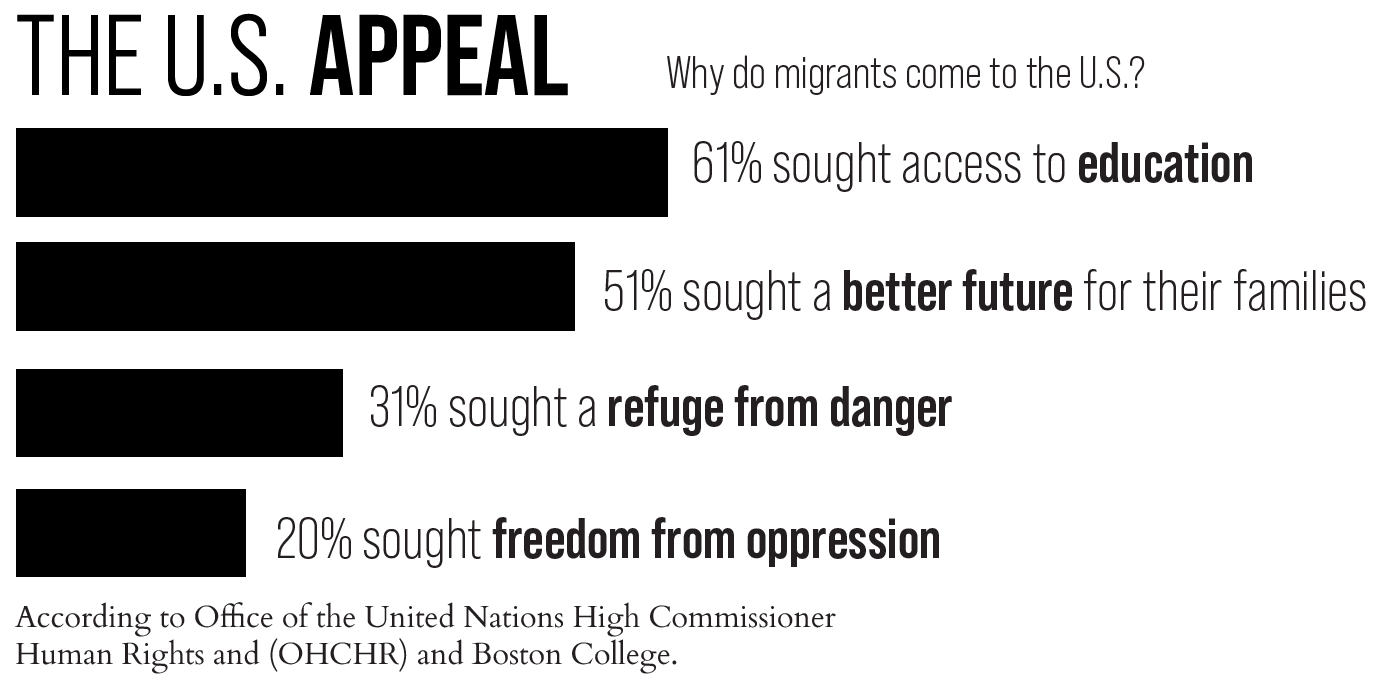President Donald Trump declared a national emergency at America’s Southern Border on Jan. 22, 2025. That statement launched his administration’s crackdown on immigration, inciting heated debates around the country and causing over 23,000 arrests and 18,000 deportations in the past month. Those debates are more than theoretical for Monarch alumnus MJ Macias, who came to America from Mexico in 2021.
“Me and my family were super lucky,” she said. “The visa that I’m going through to get my green card and my papers, it’s through the state of Colorado, so [the Trump Administration] cannot touch that visa. I do have friends who are afraid that they’re going to stay alone here in the United States because their parents are going to get deported.”
In addition to the national emergency announcement, the Trump administration also introduced a series of executive orders addressing the vetting of visa applicants, birthright citizenship, and border security, amongst other policy changes.
“Enforcing our Nation’s immigration laws is critically important to the national security and public safety of the United States,” reads an official statement from the White House. “The American people deserve a Federal Government that puts their interests first and a Government that understands its sacred obligation to prioritize the safety, security, and financial and economic well-being of Americans.”
President Trump passed ten executive orders that expanded travel bans, border militarization, and the criteria for which immigrants are vetted for deportation, in addition to limiting temporary protected status (TPS). These orders and dozens of other policy changes could impact the lives of many immigrants, even those who have legal documentation or are in the process of legalizing.
“Me, my brother and my mom, we do have a lawyer for immigration,” Macias said. “We had to have a meeting that was like, this is what you’re gonna do. This is what you have to explain. And then the papers that you have to show.”
In recent years, Denver has become a home for many immigrants. Republicans on the House Oversight Committee recently questioned Denver Mayor Mike Johnston, who reported on what he has seen facing Denver these past few years.
According to Colorado Newsline, “In a prepared statement, Johnston recounted the actions Denver took in response to the arrival of large numbers of migrants, many of them Venezuelans lawfully seeking asylum, in the city beginning in early 2023. More than 42,000 people arrived in the city over the next 18 months, in what is believed to be the largest per-capita influx of migrants of any city in the country.”
Because of this drastic increase of immigrants, primarily Venezuelan, and a higher crime rate in parts of Colorado that some residents attribute to undocumented migrants, Denver has recently emerged as a focal point for immigration debates.
Denver Public School District (DPS) in particular has taken a stand against these policies and the Immigration and Customs Enforcement (ICE) raids near schools around Colorado. Sandra Lochhead, DPS Director of Schools, has participated in the district’s efforts to understand and manage the impacts of the executive orders.
“Every time an executive order was signed, or at least weekly, we were having legal briefs on how to handle ICE if they were to show up at schools, and there are procedures for that,” Lochhead said.
Because of the recent policies, many immigrants like Macias and her friends have experienced changes in their day-to-day lives.
“We’ve seen families express a lot of fear and worry. They don’t always feel stable, and it’s hard to learn when you’re living afraid, or you’re wondering if your parent is going to be there when you get home from school,” Lochhead said.
The new policies don’t just affect immigrants who pose a security threat, but any undocumented immigrants in the US.
On Jan. 21, the acting Department of Homeland Security Secretary Benjamine Huffman issued a directive that repealed ICE guidelines from the Biden administration that stated officers must get prior approval to conduct certain arrests at “sensitive locations” like schools, hospitals, and churches, and that agents can decline to take action due to mitigating factors.
“[Immigrants] live more in fear, or just have to be cautious,” Macias said. “It’s not that I’ve committed a felony, right? Like, if you have a parking ticket, or if you have a minimal thing that’s wrong? They can get you because of that. So you have to be always super careful. You always have to be in the best way. But you also are a little bit afraid.”

Lochhead says many immigrant families fear that even schools may be too risky for their children to attend, since schools are no longer considered “safe locations.”
“I think because of the rescinding of the Sensitive Location Act, a lot of our families have been really afraid to come to school,” she said. “Kids are afraid to come to school, and families are afraid to send their kids to school.”
DPS has since put out statements that while they will not impede any government action, the district stands to “provide an education to all students regardless of their immigration status,” as stated in an update from DPS superintendent Dr. Alex Marrero.
“Something I’ve been proud of historically is that we have worked to educate whoever shows up at our door—it’s not our job to decide who receives an education or who doesn’t,” Lochhead said.
“When we start to dismantle education and make it more of a privilege than a right, that, to me, is sort of taking us back to a time where only certain people had access to education. And it’s usually the people who are privileged.”
BVSD has stated that it will maintain its resolution to protect and support students and families by not collecting or maintaining any families’ immigration status, as well as upholding BVSD policies and values while handling requests from immigration officials.
As a result of the new policies, many immigrants are struggling to find their place in the country they came to in search of better lives.
“It’s already hard enough to leave your country and everything that you know, only for people to be judging you,” Macias said. “There’s always kind of this feeling when you’re an outsider, that you are an outsider, but now they make it so evident, and it makes you feel like you don’t belong. It makes you feel unwanted, and that’s not a great feeling to have every day.”
Many immigrants who leave home and come to America do so in search of a better life than they could find in their countries. Whether due to poverty, a lack of education, or the search for a better future for younger generations, people are often forced to make difficult choices.
“It’s not that we want to make them angry, or we want to take away their jobs; we want to do this because of the needs that our country doesn’t give us, and we need to move away to give that to our families,” Macias said.
However, some argue that immigrants are lowering wages for Americans and taking jobs that could be beneficial to native-born Americans currently living in poverty. Another argument is that immigrants consume more government benefits than they generate in tax benefits.
“Build your own thoughts. Don’t let yourself get influenced by something that maybe you don’t believe,” Macias said. “So learn and explore and see what’s out there, read opinions, and be on both sides of the coin. Inform yourself about what’s actually going on.”
While BVSD doesn’t have as large an immigrant population as DPS, immigration is still a relevant topic within the community.
“At Monarch, you have to choose to see outside of your bubble, right?” Lochhead said. “You have to choose to see outside of that world and take action.”



































